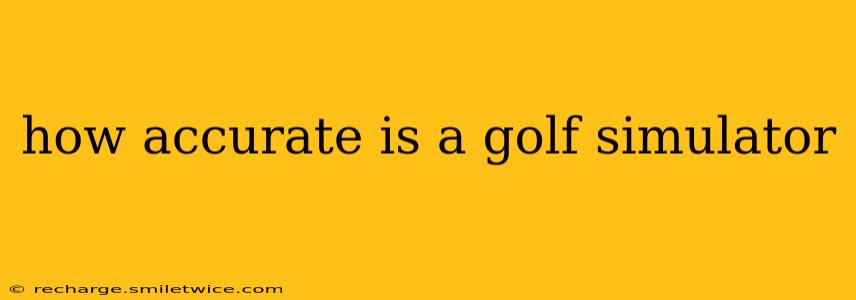Golf simulators have exploded in popularity, offering a realistic golfing experience regardless of weather or location. But how accurate are they, really? The answer, as with many things, is: it depends. The accuracy of a golf simulator hinges on several interconnected factors, from the sensor technology and software used to the quality of the setup and even the skill of the user.
What Factors Affect the Accuracy of a Golf Simulator?
Several key elements contribute to the overall accuracy of a golf simulator experience. Let's break them down:
1. Tracking Technology:
This is arguably the most critical component. Different systems employ different tracking methods:
-
Photometric Systems: These use high-speed cameras to capture the ball's flight path. Accuracy is heavily reliant on camera placement, lighting conditions, and the processing power of the software. Generally, these systems offer high accuracy, especially regarding ball speed and launch angle.
-
Radar Systems: Radar systems track the ball using Doppler radar. They're less susceptible to lighting conditions than photometric systems but can be affected by interference from other objects. Accuracy varies depending on the sophistication of the radar unit.
-
Dual-Tracking Systems: Some simulators combine photometric and radar technology for a more comprehensive and accurate reading of the ball's flight. This often results in the most accurate representation of your shot.
2. Software and Algorithms:
The software processing the data from the tracking system is just as crucial. Sophisticated algorithms are needed to accurately interpret the data and simulate the ball's flight, taking into account factors like wind, spin rate, and ball type. Higher-end simulators often utilize more refined algorithms, leading to more realistic simulations.
3. Calibration and Setup:
Even the best technology will be inaccurate if not properly calibrated and set up. Factors such as the distance between the sensor and the impact area, the levelness of the hitting surface, and the accuracy of the club data all play a significant role. Regular calibration is essential to maintain accuracy.
4. Environmental Factors:
While indoor simulators negate weather concerns, environmental factors within the simulation room can still impact accuracy. For example, strong air currents can affect ball flight, and inconsistencies in lighting can affect photometric systems.
How Accurate Are Golf Simulators in Different Aspects of the Game?
The accuracy of a golf simulator can vary depending on what aspect of the game you're evaluating:
Ball Speed and Launch Angle:
Generally, modern golf simulators are quite accurate in measuring ball speed and launch angle. High-end systems can achieve a very high degree of precision, often within a margin of error of less than 1%.
Spin Rate:
Measuring spin rate is more complex, and the accuracy varies more between systems. While good systems offer reliable measurements, less sophisticated ones may have a larger margin of error.
Trajectory and Distance:
Simulators are best at predicting the initial trajectory of a shot, but the long-term accuracy in predicting distance can be affected by environmental factors (even within a controlled environment) and the accuracy of the wind calculations used in the software.
Are Golf Simulators a Good Training Tool?
Despite the potential for inaccuracies, golf simulators offer significant benefits for training and improvement. They provide valuable feedback on various aspects of your swing, allowing you to make adjustments and track your progress over time. Used correctly, a simulator can be a powerful tool for honing your skills.
What About the Cost? Does Price Reflect Accuracy?
Generally, yes. Higher-priced simulators often utilize more advanced tracking technology and software, leading to greater accuracy. However, even high-end systems aren't perfect, and accuracy still depends on proper setup and calibration.
Can I Rely on a Golf Simulator for Tournament Preparation?
While a golf simulator can be a valuable training tool, it shouldn't be solely relied upon for tournament preparation. Nothing replicates the actual feel and conditions of playing on a real course. Simulators are best used as a supplemental training tool to complement time spent on the course.
In conclusion, the accuracy of a golf simulator is a multifaceted issue. While they offer increasingly accurate readings of key shot parameters, it's vital to consider the various factors influencing accuracy and to understand that it's not a perfect replica of an outdoor golf course. However, the technological advancements are continuously improving the accuracy and realism of the golfing experience.
